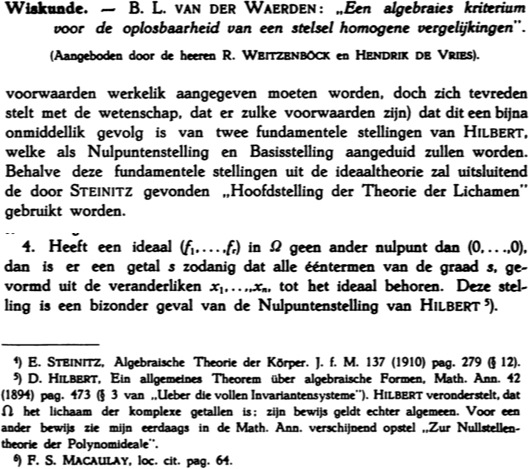The post below first appeared on hsm.stackexchange over a week ago and has received no answers there yet, so by now I think it is okay to ask it here.
This year (2021) marks the 100th anniversary of Emmy Noether's 1921 paper in which she introduced Noetherian rings and proved the primary ideal decomposition for them. The original version of her paper is here and an English translation is on the arXiv here. She of course does not call rings "Noetherian" but instead refers to rings satisfying "the finiteness condition" (die Endlichkeitsbedingung). When referring to results of Hilbert that we'd call Hilbert's basis theorem and Hilbert's Nullstellensatz at the start of Section 10 of the paper, she writes "Hilbert’s Module Basis Theorem" (Hilbertschen Theorem von der Modulbasis) and "a famous theorem of Hilbert’s" (... eines bekannten Hilbertschen Satzes). In two footnotes on this page she also refers to "Hilbert's theorem" instead of the Nullstellensatz.
The Nullstellensatz was published by Hilbert in 1893 here (see the theorem starting on the bottom of p. 320), and that was nearly 30 years earlier. I am surprised that Noether refers to that result simply as "Hilbert's Theorem". Thus my question:
What is the earliest known reference to Hilbert's theorem as the Nullstellensatz or Hilbert's Nullstellensatz (in German, presumably)?
The answer is no later than 1927, when a paper by van der Waerden here refers to Hilbert's Nullstellensatz on the top of p. 202. This is the earliest of two papers mentioned in Zentralblatt that has "Nullstellensatz" in a review. The other earliest paper in Zentralblatt is by Grete Hermann from 1926 here, which refers to Hentzelt's Nullstellensatz in the 2nd and 3rd paragraphs of the third page (Hentzelt's Nullstellensatz also appears in van der Waerden's paper on p. 203). I didn't find her mentioning Hilbert's Nullstellensatz. Hermann's paper is in English translation here -- see the first column of the second page. The paper by Hentzelt is from 1923 here (it was edited by Noether since Hentzelt went missing in Belgium in 1914 during WW1), and I did not find the term "Hilbert's Nullstellensatz" used in it.
For what it's worth, the earliest article in Zentralblatt with Nullstellensatz in a title is the paper by Rabinowitsch here (1930) in which he used his trick to prove the Nullstellensatz. That is also the earliest paper in MathSciNet's records with Nullstellensatz appearing anywhere. It's not from a real MathSciNet review since it predates the birth of MathSciNet (well, the birth of Mathematical Reviews) in 1940. The earliest real review in MathSciNet mentioning the Nullstellensatz is Zariski's paper from 1947 with his new proof of the Nullstellensatz by "Zariski's lemma".


